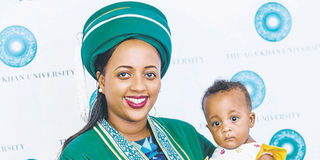Grooming the young doctors into becoming specialists

An alumni of the Aga Khan University’s Post Graduate Medical Education Program, Nancy Matillya who specialised and practices Family Medicine in Dar es Salaam and has become a role model to many young doctors. PHOTO | FILE
What you need to know:
- Under the PGME, medical graduates are enrolled and trained through an internship process to specialise on family medicine and primary care.
The Aga Khan University (AKU) is now working to bridge the human resource gap in Tanzanian’s health sector by strengthening its Post Graduate Medical Education (PGME) program.
Under the PGME, medical graduates are enrolled and trained through an internship process to specialise on family medicine and primary care.
In an interview with Your Health, the Associate Dean of Medical Education of AKU, Dr Mushtaq Ahmed explains how the varsity will increase the number of specialist doctors in the country through the PGME program.
How do you prepare medical graduates to work as specialists?
Currently, we have three programs; one in family medicine which started in 2004, whereas two others in internal medicine and surgery which started in 2016.
The 4-year training program leads to the award of the Master of Medicine degree of the Aga Khan University. Training is essentially practice based on experience and students learn directly by managing patients under supervision of the faculty.
An arrangement unique to the Aga Khan Hospital is that it pays the students a salary because the students, also called residents, provide round the clock service, which greatly contributes to the quality of care.
How do you recruit students?
We advertise through newspapers nationally and regionally and on the AKU website, which is international. The responses have been good. A transparent selection process is used to select students to each program.
At present, we have students only in the first and second years of training. By 2019 there will be a total of 28 students distributed in all 4 years of the three programs.
Why do you take a relatively small number of students?
It really depends on the current size of the Aga Khan Hospital in Dar Es Salaam. To ensure a high quality of experience and supervision, it is necessary to match the numbers of students with the hospital’s capacity. However, the hospital’s expasion is indicated to be completed by 2018. With increase in the hospital’s capacity, we will be able to increase the number of residents as well as the number of training programs by incorporating other specialties.
Have you gotten the approval from the government?
Yes, the programs have been fully accredited by the Tanzania Commission for Universities (TCU). When the residents graduate they will be registered by the Tanganyika Medical Council as specialists in their respective fields and allowed independent practice.
This will result in a significant addition to the specialist work force, not just in terms of numbers but also the caliber of the specialists. These individuals will be fit for purpose in the public as well as the private health sector in Tanzania. Family Medicine graduates in particular will be able to support the government’s primary health services.
How do you partner with the government and other stakeholders?
Aga Khan University and the Aga Khan Health Services in Tanzania have a strong track record of working with the government for instance in the Canadian government funded projects to improve maternal, neonatal and child health in underserved areas of Tanzania.
We are discussing with the Ministry of Health, Community Development, Gender, Children and the Elderly, to see if the family medicine doctors who specialise in primary care can help to improve the government’s primary health service initiatives. In order to do this, family medicine graduates will need to be absorbed in the government’s scheme of service.
What are the crucial aspects needed to make this program a success?
The programs are new and we are determined to achieve international standards and serve as a beacon. The caliber of the faculty is crucial for achieving this objective. This is what we are trying to build with the help of resources available locally as well as globally. Eventually, our graduates from the Post Graduate Medical Education programs, most of who will be Tanzanians, will be part of our faculty.




